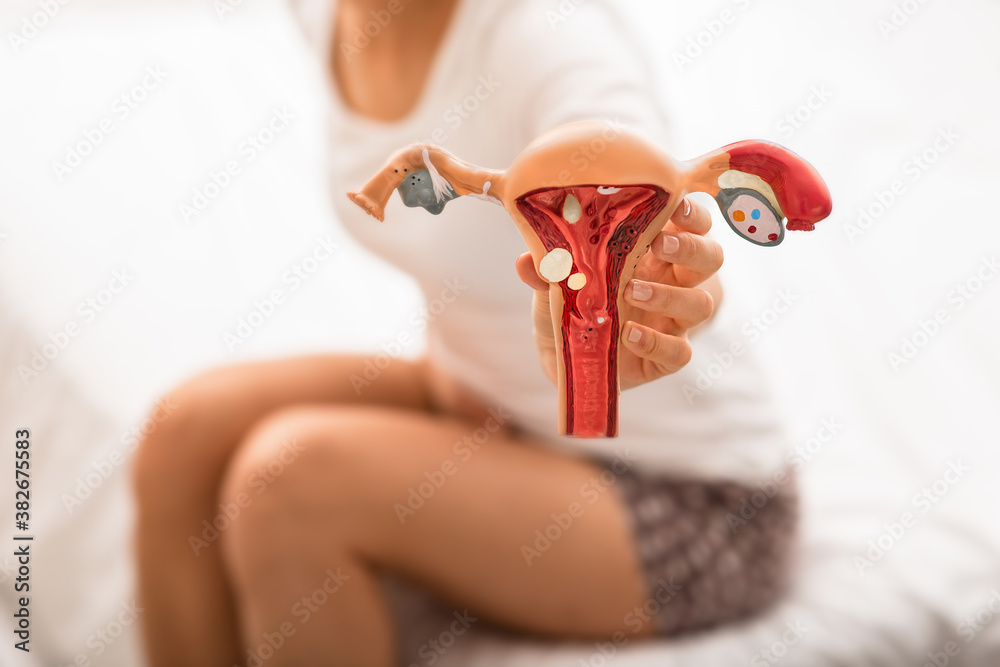Adenomyosis Treatment
Home Gynaecology Adenomyosis Treatment
Women need to prioritise their reproductive health to maintain overall well-being. One of the conditions they need to watch out for is adenomyosis, which affects their uterus. Without treatment, this condition often involves pain and distressing symptoms.


What is adenomyosis?
Adenomyosis is a condition that affects the uterus, specifically the endometrial tissue. Normally, the endometrial tissue lines the uterus’s inside and sheds during menstruation. However, in adenomyosis, this tissue grows into the muscular wall of the uterus, leading to various symptoms and complications.
What are the symptoms of adenomyosis?
The symptoms of adenomyosis can vary from person to person and may include:
-
Heavy or prolonged menstrual bleeding
-
Severe menstrual cramps
-
Pelvic pain and discomfort
-
Pressure in the abdomen or pelvis
-
Painful intercourse
-
Enlargement of the uterus

What causes adenomyosis?
The exact cause of adenomyosis remains unknown, with various theories proposed by experts:
1
Growth of invasive tissue
Some suggest that endometrial cells from the uterus lining penetrate the uterine muscle, potentially prompted by surgical procedures like caesarean sections.
2
Developmental origins
Others theorise that endometrial tissue is deposited within the uterine muscle during foetal uterine formation.
3
Uterine inflammation associated with childbirth
Another hypothesis links adenomyosis to postpartum uterine inflammation, possibly disrupting the normal cell boundary lining the uterus.
4
Stem cell origins
A recent theory proposes the invasion of uterine muscle by bone marrow stem cells as a potential cause of adenomyosis.
How is adenomyosis diagnosed?
To diagnose adenomyosis, a medical history assessment, physical examination, and imaging tests are ordered. Here’s a breakdown of the diagnostic process.
- Medical history assessment: Your healthcare provider will inquire about your symptoms, menstrual history, and any relevant medical conditions or previous surgeries.
- Physical examination: A pelvic exam is done to assess the uterus’s size, shape, and tenderness. Adenomyosis may cause the uterus to feel enlarged or tender upon palpation.
- Imaging tests:
- Transvaginal ultrasound: This imaging technique visualises changes in the uterine wall’s thickness and texture, which may indicate adenomyosis.
- Magnetic Resonance Imaging (MRI): MRI accurately detects adenomyosis and differentiates it from other conditions, such as fibroids or endometrial polyps.
- Sonohysterography: To help identify abnormalities within the uterine cavity, including adenomyosis lesions.
- Pelvic laparoscopy: A minimally invasive laparoscopy may be recommended to visually inspect the pelvic organs and confirm the presence of adenomyosis.
After evaluating the results of these diagnostic tests, your healthcare provider can definitively diagnose adenomyosis and discuss appropriate treatment options based on your circumstances and preferences.
What is cystic adenomyosis?
Cystic adenomyosis is a subtype of adenomyosis characterised by the formation of cysts within the uterine wall containing trapped blood or endometrial tissue. These cysts, also known as adenomyotic cysts or adenomyomas, can vary in size and number and may cause symptoms similar to adenomyosis.
Diagnosing cystic adenomyosis calls for imaging tests such as transvaginal ultrasound or MRI to visualise the cysts within the uterine wall. Treatment options for cystic adenomyosis may include medications to alleviate symptoms, minimally invasive procedures, or surgical interventions to remove the cysts.
How will adenomyosis impact pregnancy?
While some women with adenomyosis conceive and carry a pregnancy to term without complications, others may experience difficulties.
- Increased risk of miscarriage: Adenomyosis has been associated with a risk of miscarriage, particularly in cases where the condition leads to uterine abnormalities or affects the implantation of the embryo.
- Preterm birth: Women with adenomyosis may have a higher likelihood of preterm birth, which can pose health risks to both the mother and the baby.
- Placental abnormalities: Adenomyosis may impact the development and function of the placenta, leading to complications such as placental insufficiency or placenta previa.
Increased risk of caesarean delivery: Adenomyosis can cause the uterus to become enlarged and distorted, making vaginal delivery more challenging. As a result, women with adenomyosis may likely require a caesarean section (C-section) for delivery.
Does adenomyosis cause infertility?
Adenomyosis has been associated with infertility. It is believed that adenomyosis may interfere with embryo implantation or disrupt the normal functioning of the uterus, leading to difficulties in conceiving.
What are the available treatment options for adenomyosis in Singapore?
- Pain management: Medication to help relieve pelvic cramps and pain.
- Hormonal therapy: Hormonal therapy such as birth control pills and hormonal IUDs may help regulate menstrual cycles and reduce symptoms.
- Surgery: Surgical options such as a hysterectomy (removal of the uterus) may be considered for severe cases or for those who have completed childbearing,
- Lifestyle changes: Dietary modifications and recommended practices such as yoga and acupuncture for relief.
Should you undergo laparoscopic surgery for adenomyosis?
Here are some scenarios in which laparoscopic surgery for adenomyosis may be considered:
- Severe symptoms: Severe pelvic pain, heavy menstrual bleeding, or infertility significantly impacting a woman’s quality of life.
- Failed conservative treatment: Insufficient relief from symptoms with conservative treatment.
- Desire to preserve fertility: To alleviate symptoms while maintaining the possibility of future pregnancy.
Can you treat adenomyosis without surgery?
If the adenomyosis symptoms are not too severe, they may be managed with conservative treatments such as medications. These approaches may help alleviate pain, reduce menstrual bleeding, and improve overall quality of life without surgery. You should consult a doctor to get a proper assessment.
Adenomyosis treatment in Singapore
Adenomyosis is a common yet often overlooked condition that can deeply impact a woman’s quality of life. If you suspect having adenomyosis or are experiencing symptoms suggestive of the condition, it is essential to consult a specialist.
Dr Chang T C is an esteemed Obstetrician and Gynaecologist in Singapore with over 29 years of experience in the field. He brings expertise and compassion to his practice, offering comprehensive care and personalised treatment options for patients with adenomyosis and other gynaecological conditions.
FAQs
Who is at risk of adenomyosis?
While adenomyosis can affect women of any age, it is most commonly diagnosed in women aged 40 to 50 who have had children.
What shrinks adenomyosis lesions?
No single treatment can permanently shrink adenomyosis lesions. However, hormonal medications may help reduce symptoms by suppressing the growth of endometrial tissue.
What lifestyle changes can help manage adenomyosis symptoms?
Adopting a healthy lifestyle that includes regular exercise, a balanced diet, stress management, and adequate sleep, may help alleviate symptoms of adenomyosis.
Is adenomyosis linked to endometriosis?
Although adenomyosis and endometriosis both involve abnormal growth of endometrial tissue, they are distinct entities that may occur separately or together in the same individual.
Can adenomyosis recur after treatment?
In some cases, adenomyosis symptoms may recur after treatment, especially if the underlying hormonal imbalance or inflammation is not adequately addressed.
Is it possible to have adenomyosis without noticeable symptoms?
Yes, some women may have adenomyosis without experiencing any noticeable symptoms. In such cases, the condition may be incidentally uncovered during imaging tests performed for other reasons.
Can adenomyosis symptoms change over time?
Adenomyosis symptoms may fluctuate over time, with some women experiencing periods of exacerbation followed by periods of remission.
Can adenomyosis be prevented?
There are no known methods for preventing adenomyosis. However, maintaining overall health and addressing risk factors such as hormonal imbalances or inflammation may help reduce the likelihood of developing the condition.